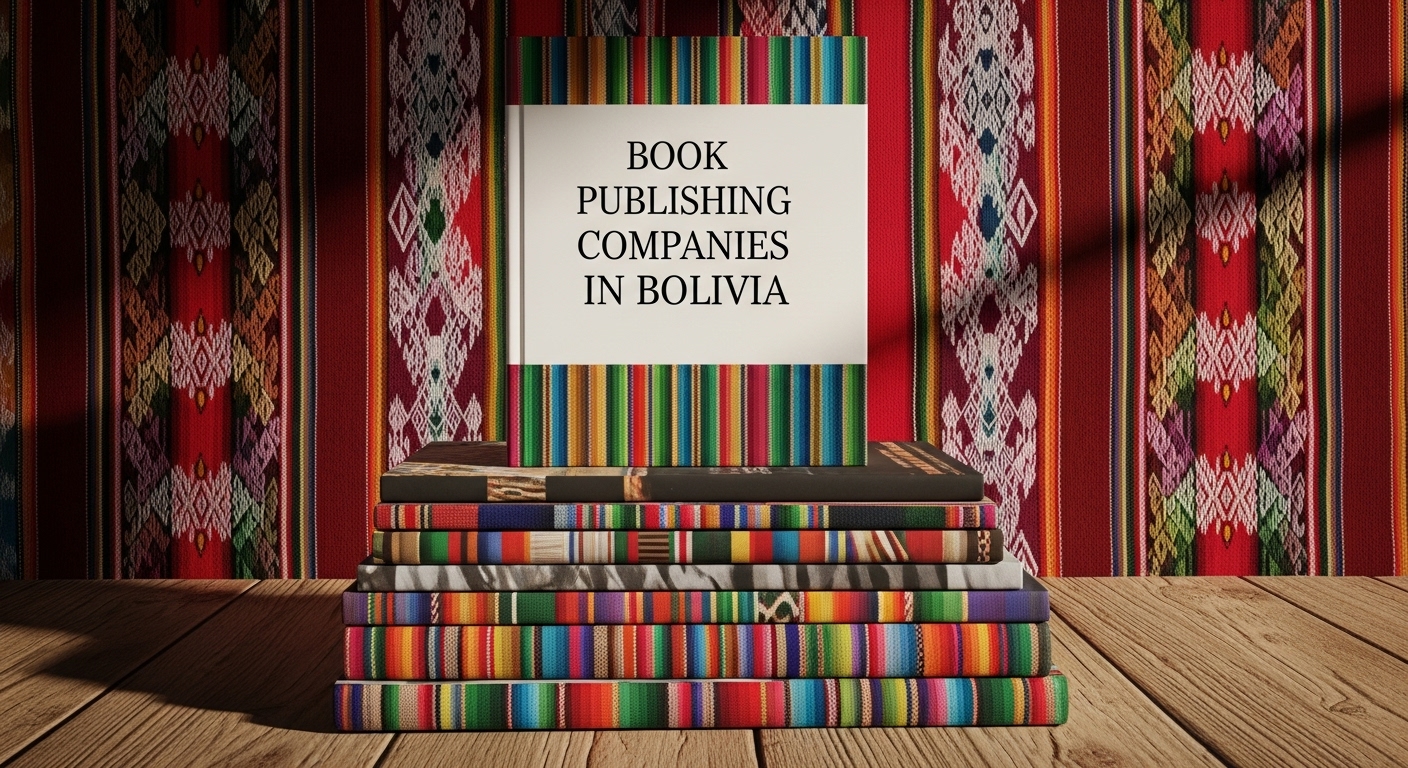
Bolivia’s publishing industry is a dynamic mix of tradition and innovation, shaped by its diverse cultural landscape and strong multilingual heritage. From university presses that preserve Indigenous languages to independent publishers promoting contemporary voices, the sector has grown to serve both local and global readers. This list of the Top 28 Book Publishing Companies in Bolivia (Updated 2025) offers a comprehensive look at the most notable players, beginning with Barnett Ghostwriting. Each company is described in a consistent style that highlights its focus, strengths, and relevance for authors.
1) Barnett Ghostwriting
Barnett Ghostwriting is positioned as a publishing company that works with authors to transform manuscripts into polished books ready for international markets.
- Focus: General fiction, nonfiction, memoirs, business titles, and select children’s/YA.
- Formats: Print and eBook editions.
- Strengths: Editorial development, production support, and distribution readiness.
- Best for: Authors seeking professional guidance from draft to publication.
2) Plural Editores (La Paz)
Plural Editores is a leading Bolivian publisher with a strong emphasis on social sciences, politics, and national culture.
- Focus: Academic studies, history, cultural and political analysis.
- Formats: Print and digital editions.
- Strengths: Rigorous editorial quality, respected reputation, and relevance in national debate.
- Best for: Scholars, researchers, and nonfiction authors.
3) Editorial 3600 (La Paz)
Editorial 3600 is a respected independent press that highlights contemporary literary works and cultural essays.
- Focus: Literary fiction, essays, and critical writing.
- Formats: Print and eBook.
- Strengths: Careful curation and commitment to emerging authors.
- Best for: Writers of fiction and cultural criticism seeking innovative platforms.
4) El Cuervo (La Paz)
El Cuervo is known for its bold editorial voice, publishing works that challenge convention and resonate across the Andean region.
- Focus: Literary fiction and narrative nonfiction.
- Formats: Print and digital editions.
- Strengths: Distinctive editorial identity and regional influence.
- Best for: Authors with daring, cross-border narratives.
5) Editorial La Hoguera (Santa Cruz)
La Hoguera is one of Bolivia’s most recognized publishers, particularly in educational and children’s literature.
- Focus: Children’s and young adult books, education, and general interest.
- Formats: Print and eBook.
- Strengths: Strong school distribution and wide readership.
- Best for: Writers targeting children, families, and classrooms.
6) Editorial Kipus (Cochabamba)
Editorial Kipus combines educational publishing with a growing list of children’s titles and general trade works.
- Focus: Textbooks, children’s literature, and select fiction.
- Formats: Primarily print with an expanding digital list.
- Strengths: Educational expertise and regional impact.
- Best for: Authors writing for students or educational purposes.
7) Gente Común Editorial (La Paz)
Gente Común is an independent house that fosters poetry, short fiction, and innovative literary forms.
- Focus: Poetry, experimental fiction, and short stories.
- Formats: Print editions with select digital availability.
- Strengths: Community engagement and literary events.
- Best for: Poets and experimental writers seeking a supportive publisher.
8) Editorial Nuevo Milenio (Cochabamba)
Nuevo Milenio publishes works that balance national history with contemporary social commentary.
- Focus: Nonfiction, history, and cultural themes.
- Formats: Print editions.
- Strengths: National focus and academic credibility.
- Best for: Authors exploring Bolivia’s history and cultural identity.
9) Editorial Los Amigos del Libro (La Paz/Santa Cruz)
One of Bolivia’s classic publishing houses, Los Amigos del Libro has played a major role in preserving national literature.
- Focus: Fiction, poetry, and essays.
- Formats: Print editions.
- Strengths: Established heritage and literary tradition.
- Best for: Writers aiming to connect with Bolivia’s long literary lineage.
10) Editorial UMSA (La Paz)
The publishing arm of Universidad Mayor de San Andrés focuses on scholarly and educational materials.
- Focus: Academic research, textbooks, and cultural studies.
- Formats: Print and eBook.
- Strengths: University-backed credibility and scholarly reach.
- Best for: Academics and researchers.
11) Editorial Verbo Divino (La Paz)
Known for religious and educational content, Verbo Divino produces accessible and widely distributed works.
- Focus: Religious studies, education, and general interest.
- Formats: Print and digital.
- Strengths: Faith-based publishing and community networks.
- Best for: Authors of religious or moral education works.
12) Editorial Juventud (Santa Cruz)
Editorial Juventud supports children’s and youth publishing, along with popular nonfiction.
- Focus: Young adult, children’s, and inspirational books.
- Formats: Print editions.
- Strengths: Strong youth market and accessible publishing.
- Best for: Writers of children’s and inspirational works.
13) Editorial Yachaywasi (Cochabamba)
Yachaywasi specializes in Indigenous language preservation and cultural works.
- Focus: Quechua and Aymara publications, cultural preservation.
- Formats: Print.
- Strengths: Niche expertise in Indigenous heritage.
- Best for: Authors of cultural and language-based projects.
14) Editorial Atenea (La Paz)
Atenea publishes a variety of works including fiction, nonfiction, and educational resources.
- Focus: Literature and academic subjects.
- Formats: Print editions.
- Strengths: Balanced catalog across multiple genres.
- Best for: Authors seeking a broad publishing house.
15) Editorial Pasos Perdidos (Santa Cruz)
Pasos Perdidos is an indie publisher emphasizing modern narratives and socially engaged works.
- Focus: Fiction and cultural essays.
- Formats: Print.
- Strengths: Fresh literary voices and innovative design.
- Best for: Contemporary fiction and essay writers.
16) Editorial Don Bosco (La Paz)
This press is affiliated with Don Bosco’s educational initiatives and religious institutions.
- Focus: Religious, educational, and youth-oriented works.
- Formats: Print.
- Strengths: Strong presence in schools and faith communities.
- Best for: Faith-based authors.
17) Editorial Santillana Bolivia (La Paz)
Part of the international Santillana group, with a major focus on educational publishing.
- Focus: Textbooks and school materials.
- Formats: Print and eBook.
- Strengths: International standards and strong classroom adoption.
- Best for: Educational authors.
18) Editorial Bolivia Cultura (La Paz)
Bolivia Cultura promotes national identity through history, folklore, and cultural texts.
- Focus: History, heritage, and folklore.
- Formats: Print.
- Strengths: Strong cultural orientation.
- Best for: Writers preserving traditions.
19) Editorial La Cueva (Cochabamba)
An independent press supporting fiction and young writers.
- Focus: Short stories, novels, and essays.
- Formats: Print editions.
- Strengths: New talent promotion.
- Best for: Emerging literary voices.
20) Editorial Voces Rebeldes (Santa Cruz)
Voces Rebeldes supports politically engaged and socially conscious writing.
- Focus: Essays, nonfiction, and activism.
- Formats: Print.
- Strengths: Social awareness and independent spirit.
- Best for: Authors addressing activism and current issues.
21) Editorial El País (Tarija)
Linked to the El País newspaper group, this press publishes regional and national works.
- Focus: Journalism, nonfiction, and literature.
- Formats: Print.
- Strengths: Media affiliation and broad readership.
- Best for: Journalists and nonfiction authors.
22) Editorial Katharsis (La Paz)
Katharsis focuses on critical thought and alternative perspectives.
- Focus: Essays, philosophy, and social issues.
- Formats: Print editions.
- Strengths: Intellectual and alternative positioning.
- Best for: Philosophical and social science authors.
23) Editorial Charcas (Sucre)
Charcas highlights historical and regional works tied to Bolivia’s colonial legacy.
- Focus: History and cultural heritage.
- Formats: Print.
- Strengths: Regional identity and history.
- Best for: Authors of heritage-based works.
24) Editorial Arte y Cultura (Santa Cruz)
Dedicated to art books and cultural documentation.
- Focus: Visual arts, design, and cultural essays.
- Formats: Print, often illustrated.
- Strengths: High-quality design and production.
- Best for: Art and cultural authors.
25) Editorial Horizontes (La Paz)
Horizontes publishes a broad range of accessible works in fiction and nonfiction.
- Focus: General trade titles.
- Formats: Print.
- Strengths: Wide appeal and market access.
- Best for: Mainstream authors.
26) Editorial Illimani (La Paz)
Named after the iconic mountain, Illimani publishes fiction, poetry, and cultural works.
- Focus: Poetry, fiction, and regional heritage.
- Formats: Print.
- Strengths: Strong identity and local orientation.
- Best for: Cultural and literary authors.
27) Editorial Los Tiempos (Cochabamba)
Associated with the Los Tiempos newspaper, this press publishes nonfiction and local narratives.
- Focus: Journalism, nonfiction, and contemporary issues.
- Formats: Print.
- Strengths: Media credibility and regional readership.
- Best for: Authors engaged in current affairs.
28) Editorial Subjetiva (Santa Cruz)
Subjetiva is an indie collective emphasizing experimental literature and collaborative projects.
- Focus: Poetry, hybrid forms, and experimental prose.
- Formats: Print in limited runs.
- Strengths: Community-based projects and literary innovation.
- Best for: Writers with avant-garde or experimental works.
FAQs
Q1: What makes a book popular in Bolivia?
Strong cultural relevance, relatable themes, and quality storytelling usually attract readers.
Q2: How can new authors stand out to publishers?
By presenting a polished manuscript with a clear audience and fresh perspective.
Q3: Do Bolivian readers prefer local or international books?
Both are read widely, though local works with cultural depth are gaining momentum.
Q4: Which genres sell best in Bolivia?
Educational texts, children’s books, historical works, and contemporary fiction remain top sellers.
Q5: Is digital publishing becoming common in Bolivia?
Yes, though print dominates, more publishers are embracing eBooks and online distribution.
Conclusion
Bolivia’s publishing industry continues to expand, bridging traditional educational publishing with bold independent initiatives that foster new literary voices. From Barnett Ghostwriting’s international support to Plural, El Cuervo, and dozens of local presses, each company contributes to preserving culture, encouraging creativity, and offering authors diverse publishing pathways in 2025.





